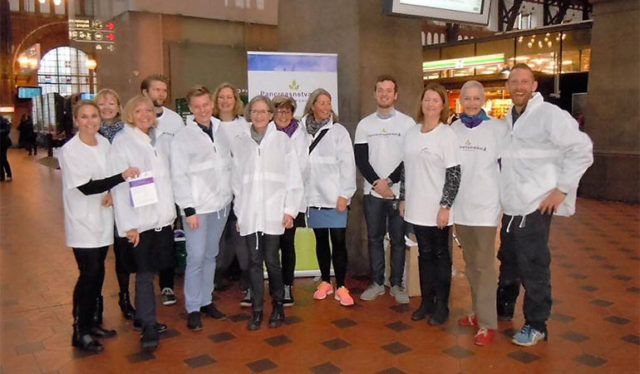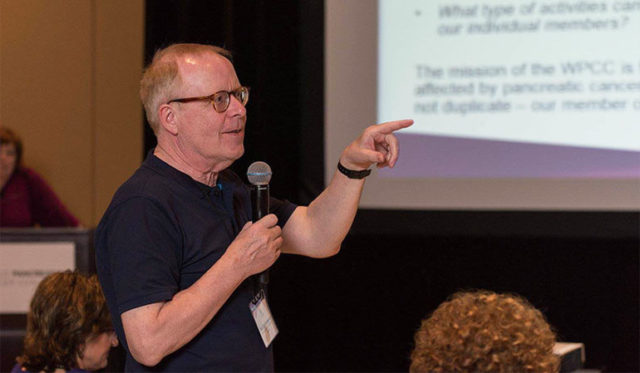The Danish pancreatic cancer patient organization Pancreasnetvaerket i Danmark came into being in the spring of 2015, upon the initiative of Mr. and Mrs. Niels-Erik and Gunna Olsen. When Olsen was diagnosed with pancreatic cancer in the fall of 2014, he and his wife quickly realized there was an urgent need for an organization that could distribute information about this rarely known disease and provide support for patients and their caregivers. Therefore, they took upon themselves the Herculean task of organizing the first nationwide pancreatic cancer patients’ conference in Denmark, which took place at the University Hospital in Odense in May 2015. More than 50 patients and caregivers from across the country attended, listening to presentations from leading Danish surgeons and oncologists.

The Pancreasnetvaerket i Danmark team at a rally at Copenhagen Central Station on World Pancreatic Cancer Day 2015.
Olsen passed away shortly after this successful event. But another pancreatic cancer patient, Inger Marie Amdi, stepped in, and with the backing of a small steering committee, she officially founded the network and initiated the organizing for the Danish events on World Pancreatic Cancer Day on Nov. 13, 2015. A rally at the Central Station in Copenhagen reached out to thousands of train passengers that morning, and later in the day, 65 patients and caregivers gathered at the University Hospital in Herlev to hear presentations from leading Danish surgeons, oncologists and professors in palliative care from all the major Danish hospitals.
Once again, the Danish organization was hit hard when Amdi passed away in February 2016. But the steering committee regrouped, adding new members and continuing the much-needed organizing. Thus, Pancreasnetvaerket i Danmark was represented by Poul Ejby Rasmussen at the inaugural conference of the World Pancreatic Cancer Coalition in Orlando, Fla., in May 2016.
Rasmussen said that today, the organization is confronted with three major tasks.
“First and foremost is the continued recruitment of new members — not an easy task, by the nature of the disease we have in common,” he said. “Next, we must continue to give support and counselling to both patients and caregivers. And finally, despite our limited numbers and resources, we are being called upon by the Danish health authorities to give our input into the ongoing reorganization and improvement of pancreatic cancer care in Denmark.
“So, the plate in front of us is more than full.”

Poul Ejby Rasmussen of Pancreasnetvaerket i Danmark speaks at the inaugural conference of the World Pancreatic Cancer Coalition in Orlando, Fla., in May 2016.
Rasmussen added that he was extremely grateful to have the backing of the WPCC, saying: “We cannot increase public awareness about this dreadful disease all by ourselves, not to mention raising funds for much-needed research. For this very important work, we rely upon the WPCC.”
The greatest achievement of Pancreasnetvaerket i Danmark so far?
“That we are still here, trying to help pancreatic cancer patients and caregivers in any way we can,” Rasmussen said.
